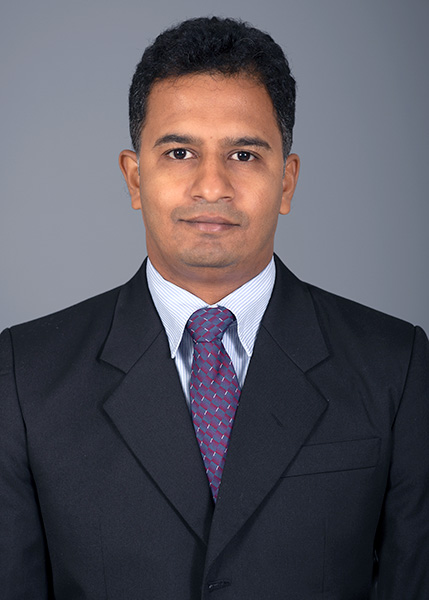- Faculty
- Undugodage Don Nuwan Perera
Undugodage Don Nuwan Perera

Contact Information
Email: uperera@wcu.eduPhone: 828.277.2644
Office: 333 Apodaca Science Building Building
Biography
Dr. Nuwan Perera is originally from Sri Lanka and he obtained his B.Sc. degree from University of Kelaniya in 2006. He moved to the United States for graduate school and earned his Ph.D in analytical chemistry from Oklahoma State University. His graduate research focused on analysis of automotive paint using vibrational spectroscopy and chemometrics for forensic purposes. He developed IR search prefilters from IR transmission spectra in the PDQ library that were transformed into ATR spectra using an ATR simulation algorithm for the purpose of identifying the assembly plant of the vehicle involved in a hit-and-run accident from an ATR spectrum of its clear coat paint smear. He also explored the use of water rich mobile phases in High Performance Liquid Chromatography (HPLC). After his Ph.D., he continued to work at Oklahoma State University as a Postdoctoral Fellow where, he worked on transmission and Infrared Spectroscopic (IR) imaging. In this research work, he investigated the use of multivariate curve resolution (MCR) on IR imaging data applied to the forensic examination of automotive paints. Following his postdoctoral studies Dr. Nuwan Perera joined WCU in the fall of 2017.
Education
- Ph D, Oklahoma State University Stillwater
- BS, University of Kelaniya, Sri Lanka
Teaching Interests
As a faculty in the Department Chemistry and Physics and the Forensic Science program at WCU, Dr. Perera teaches variety of classes in the fields of Forensics and Chemistry. He routinely teaches Forensic Chemistry lecture and laboratory classes (his favorite) and lower level general chemistry classes including General Chemistry I and II. He occasionally teaches Physical Methods in Forensic science, Instrumental Analysis Laboratory, Organic Chemistry Laboratory, and Forensic Seminar classes.
Research Interests
Dr. Perera’s research focuses on spectrochemical and chromatographic analysis applied to problems in forensic and analytical chemistry. His projects include, investigation of the effect of weathering of automotive clearcoats on forensic paint examination using Fourier transform infrared spectroscopy (FTIR), analysis of human decomposition odor using gas chromatography mass spectrometry (GC-MS) and high performance liquid chromatography (HPLC), and use of water rich mobile phases in HPLC for the analysis of drugs of abuse and consumer products.